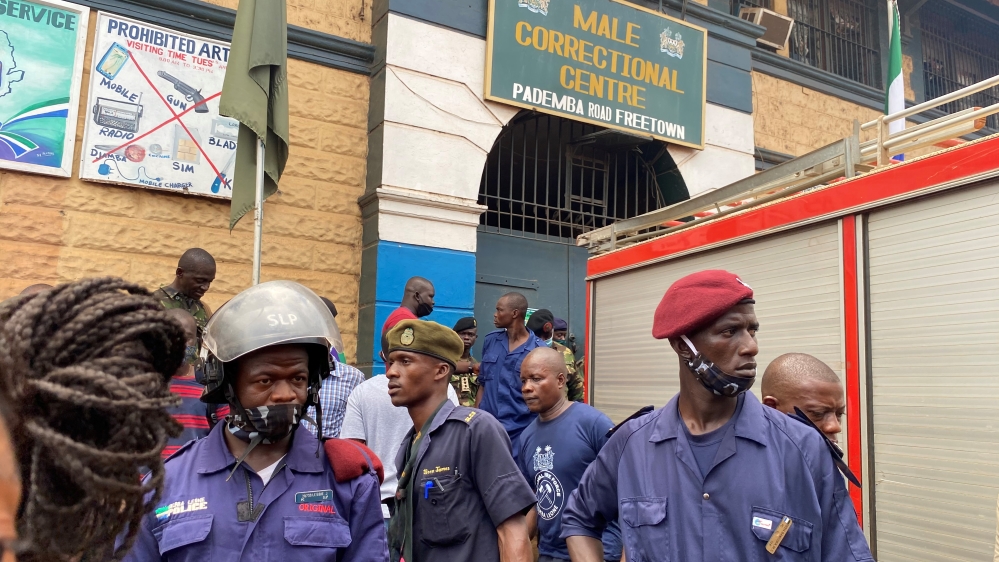Salone Correctional Centers Decongest
By Kongbap Sumner

“I spent eight months at the Pademba Road Correctional Centre for alleged larceny – stealing a wall clock in a Mosque. I was released when I became very sick with pneumonia and other complications as I was sleeping on the bare floor,” said Paul Cooper, jailed in 2019 for a petty crime he denied. Like him, hundreds and maybe thousands of Sierra Leoneans linger in sub-human conditions in overcrowded prisons.
Originally built for 324 inmates, the Pademba Road Correctional Centre had over 1,300 inmates, representing an overcrowding of over 400% at the time of the riot. According to the Sierra Leone Correctional Services (SLCS)’s official report, part of the main block was burnt, exacerbating the overcrowding, jeopardizing the life and security of all inmates, in violation of the UN’s number one basic principle for the Treatment of Prisoners: to be treated with the respect due to their inherent dignity and value as human beings.
An independent report by the local NGO Prison Watch looking into the reasons for the riot and its aftermath was banned by government officials.
Overcrowding at Pademba Road Correctional Center was even worse than that. According to Moses Lamin Kamara, Judiciary PRO, during the last Special Criminal Session held at the Pademba Road Correctional Centre, inmate congestion was reduced from 1,700 to 1,200.
Alternative punishments could be a solution
Sierra Leone’s entire correctional centres system was built with an original capacity of 1,993 inmates. Today, 4,400 inmates are crammed inside these spaces, according to Chief Inspector Leslie Cole-Showers, SLCS Public Relations Officer. Among the key reasons for overcrowding are wrong charges against defendants and delayed trials, Cole-Showers said.
Alternative punishments, such as community service for petty crime offenders, could help reduce overcrowding. The police “must be blamed for charging suspects without sufficient evidence. Some suspects spend years in prison only to be released for lack of sufficient evidence,” Cole-Showers stated.
But the Sierra Leone Police (SLP) Spokesperson, Superintendent Brima Kamara, denied that the police are responsible for overcrowding. He complained that many of the cases charges to court by the SLP are not granted bail, only to be dismissed later due to the lack of sufficient evidence. This means that potential innocent people spend months in jails before being released, when they could have been out on bail.
For example, in 2019, the SLP recorded 75,729 reported criminal and civil cases nationwide. Only 3,276 cases, representing 4,33%of the total, were prosecuted. Of those prosecuted, 381 accused persons were discharged, 160 were cautioned and then discharged, 60 were acquitted, 696 accused were fined and/or sentenced, 504 were committed to High Courts, 5 cases were nullified by the Director of Public Prosecutions (DPP) or the Attorney General, and the remaining of 1,478 cases are pending trial in Magistrate Courts. This was according to the SLP report released in 2020.
Another major contributor to prison overcrowding is that witnesses refuse to testify and provide evidence while the arrested linger in jail for months and even years, Superintendent Kamara said.
Erroneous charges and delayed justice destroy lives
In 2018, Abu Conteh spent three months at the Pademba Road Correctional Centre because he owed someone 10 million Leones and could not pay.
Abdul Fatoma, Executive Director for the Campaign for Human Rights and Development International (CHRDI), said that erroneous charges by the police and delayed court proceedings are the main reasons for overcrowding. Correctional centres in the Northwest region hold a total of 1,460 inmates, both male and female, while the entire correctional system has only 317 staff, which is grossly inadequate, he said. “If any riot takes place, the inmates will overpower the correctional services staff,” Fatoma warned.
According to SLCS data, the Pademba Road Correctional Centre was understaffed by 40% at the time of the deadly riot in 2020. One prison staff also died in the incident.
Fatoma added that there are over 200 inmates at Pademba Road who require specialized psychological care, but there are no trained staff to help them. The SLCS confirmed that there is no trained psychiatrist at the centre. “In addition, there are over 1,000 inmates at the same centre with only 300 staff. The standard ratio [should be]six inmates to four staff. But, in Sierra Leone, it is one staff to 10 or 15 inmates. There is a need for psychological doctors and nurses to be attached to correctional centres nationwide, ”Fatoma said.
COVID-19 in the prisons
The COVID-19 pandemic further complicated issues in chronically overcrowded prisons. “We are afraid, and taking preventive measures to ensure there is no recorded case [of COVID-19] in the centres, because they are all overcrowded and having a confirmed case will be disastrous for us,” Cole-Showers warned. SLCS’s investigation into the 2020 riot found that drastic measures as a result of COVID-19 pandemic that restricted movement within the facility, and suspended court proceedings were among the causes that sparked the riot.
Correctional centres in Port Loko, Moyamba, Pujehun and Koinadugu Districts have no judge(s) to seat on matters, according to Moses Lamin Kamara, PRO for the Sierra Leone Judiciary. Kamara said that the judiciary plans on holding Special Criminal Sessions to speed up trials and decongest the prisons.
In 2019, the United Nations Development Program (UNDP), with support from the US Bureau of International Narcotics and Law Enforcement Affairs (INL) through the US Department of State constructed a simulation centre in Waterloo, and two blocks at the Mafanta Correctional Centre in Tonkolili with the capacity of 150 each All centres were built to ease overcrowding from the Pademba Road Correctional Centre. Despite that, by April 2020, Pademba Road still had 400% overcrowding.
The UNDP also sponsored Correctional Centre Prison Courts, which helped release 47 inmates in 2020, according to Kamara, who stressed that although offences such as murder, treason, robbery with aggravation and robbery with violence are not bailable at magistrates’ court level, bail can and should be granted by a High Court if certain conditions are met. The outbreak of COVID-19 stalled court proceedings, and again contributed to overcrowding. In 2021, Kamara said, 1,000 inmates appeared their case before 15 judges, and 47 who had been in prison for long periods without trial were released.
Kamara said that the 2018 Bail Regulations/Policy addresses overcrowding. For example, it states that all traffic offences are liable to bail on first appearance, it provides for self-bail for people living with disabilities, those below the age of 18 years, pregnant and lactating mothers, the aged and principal caregivers even for serious offences, Kamara explained.
In Kenema inmates take turn to sleep
Fatoma and CHRDI visited the prisons early this year to assess the situation. At the Correctional Centre in Kenema District, he said, inmates take turns to sleep because there is no room. Due to severe overcrowding, the inmates develop and spread skin diseases, syphilis, and other parasites, he said. Sadly also, when inmates die, authorities lack mechanisms to effectively contact and inform the family. This was confirmed by SLCS in their July 2020 report of the riot, when only six of the 30 dead inmates were identified by family members. The others remained in the morgue, unidentified.
To decongest the Correctional Centres, there is need to overhaul the entire Correctional Centre system, including an effective judiciary, records management, security management, infrastructure and manpower as well as the laws. There is a clear need for optional punishments, other than prison terms for offenders, Fatoma said.
These below are the prison staff vs. inmates’ ratios in some of the correctional centres according to data from the CHRDI:
Makeni Correctional Center: 89 SLCS staff oversee 120 inmates.
Sefadu Correctional Center: 44 SLCS staff oversee 117 inmates.
Mafanta Correctional Center: 92 staff oversee 268 inmates.
Moyamba Correctional Center: 45 staff oversee 104 inmates.
Kailahun Correctional Center: 36 staff oversee 104 inmates
Kenema Correctional Center: 60 staff oversee 245 inmates
Bo Correctional Center: 27 staff oversee 281 inmates
Waterloo Pre-Trial Center: 53 staff oversee 96 inmates
Kingtom Approved School for Children: 16 staff oversee 42 juveniles.


